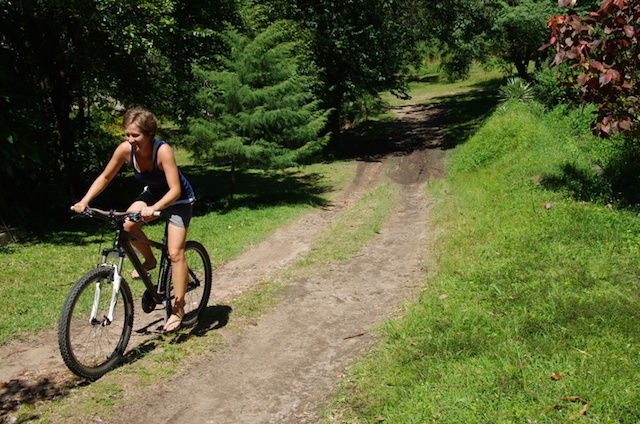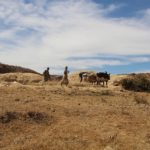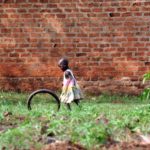Travel Malawi: Cycling Holidays Are In

“I’m cycling from Cape Town to Cairo,” said the Scottish tourist I was chatting with. After his proud declaration, he was evidently waiting for me to gush with admiration and jealousy.
It was out of my mouth before I could stop myself. “Why would you ever want to cycle in Africa?” Shock and horror was plain on my not-so-poker face. I don’t think Ben got my type of reaction very often, and he was clearly unimpressed. Our conversation petered out soon after my outburst.
But you’ve got to be a masochist to willingly cycle through Africa! It’s hot and dusty with terrible roads. Cows, goats, dogs, and people unpredictably race across your path. Ramshackle vehicles, driven by careless (read: psychotic) drivers, speed down narrow highways, spouting the blackest of fumes.
My own short cycling trips to markets or tourist sites throughout Africa always ended with frayed nerves, a thankful prayer at my miraculous survival, and a silent promise never to cycle here again.
And yet, apparently, cycling tourism in Africa has become a bit of a craze in recent years. I’d never understood it—until I arrived in Malawi. We had just crossed the border from Tanzania, and I was sitting in the car mindlessly watching the traffic go by while my husband emptied the town’s only ATM of all of its available cash. It was taking a long time, and I was bored.
I slowly became aware that there were a lot of bicycles going by, and few cars. This struck me as strange, since I was staring out at the main transit highway between the border and Lilongwe, Malawi’s capital.
And yet, apparently, cycling tourism in Africa has become a bit of a craze in recent years. I’d never understood it—until I arrived in Malawi.
I decided to count the bicycle-to-motorized vehicle ratio. I counted up for each bicycle I saw, and jotted down the total each time a motorized vehicle broke the count. When my husband returned—a long while later—with wads of near-worthless bills, I calculated the mean average of the data in front of me. The conclusion of my very, very scientific experiment: Seven bicycles pass, on average, for every one motorized vehicle on this Malawian highway.
At over $2 a liter, Malawi sells the most expensive fuel on the African continent. And that has done much to shape the nature of travel and transportation in this poverty-stricken country.
Here, the few vehicles on the road mostly belong to international aid agencies and police officers. Occasionally, a truck or lorry will drive past, carrying not only the goods it was meant to transport but fare-paying passengers hanging off the edges and stuffed amid the goods to offset the steep cost of fuel. Minibuses, ubiquitous throughout Africa, are still plying the highways of Malawi. But they are fewer and farther between than in other countries, and packed so fully that their heavy rear-ends dangle dangerously close to the road as they speed by.
Women, dolled up in high-heels and leather purses, sit side-saddle on the backs of bicycle taxis, casually talking on the phone while breast-feeding their babies.
The poorest of Malawians walk. Indeed, pedestrians frame every road and have permanently worn down the grasses around the roadside into a dusty, muddy pulp. But most Malawians seem to ride bicycles. People cycle past juggling bundles of wood, sacks of charcoal, and tobacco leaves bound for auction. Entire families dangle precariously off a single bicycle. Men cart enough thirty-liter water jugs to quench an entire village’s thirst.
Malawians have perfected the art of bicycle balance. They have also perfected the use of bicycle-as-taxi. Padded seats placed over the back wheel of a bicycle lure paying customers at busy town corners. Women, dolled up in high-heels and leather purses, sit side-saddle on the backs of bicycle taxis, casually talking on the phone while breast-feeding their babies.
In Malawi, the bicycle is chic.
I had never called a bike ride in Africa relaxing before. But with the lack of cars and profusion of bicycles, that’s exactly what it was.
I wanted to be chic. So, despite my silent promise, I dusted off my bike and set off. Positioned safely between a cluster of other bicycles peddling along the highway toward the nearest town, I was free to take in the scene. The people, the villages, the stunning landscape—I absorbed it all from the relaxing seat of my bicycle. I had never called a bike ride in Africa relaxing before. But with the lack of cars and profusion of bicycles, that’s exactly what it was.
Malawi is the best country in Africa to plan your long-awaited cycling trip. Its small size means short distances between attractions. It has an abundance of affordable road-side accommodation. Its omnipresent roadside bicycle shops stock spare parts and repair kits. It has the perfect balance between flat lakeside cycling and challenging escarpment mountain biking.
And most importantly, it has the most cycling-friendly roads in all of Africa. Fuel prices are sure to normalize–its effects have caused waves through every aspect of Malawian life–so just make sure to check fuel prices before you book your trip.









